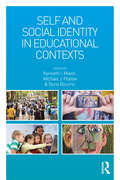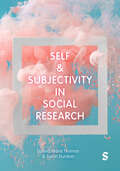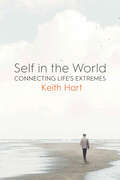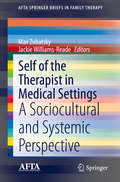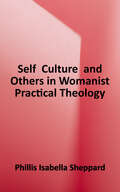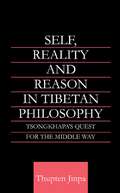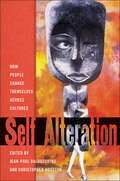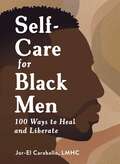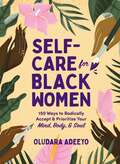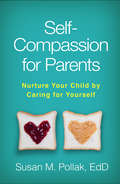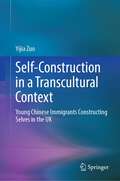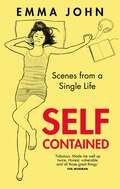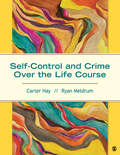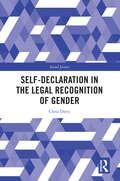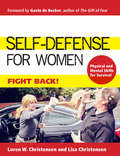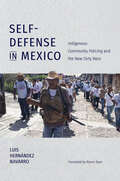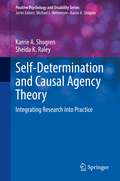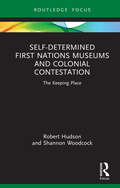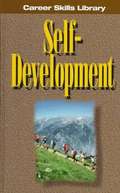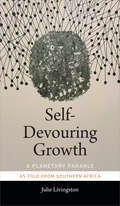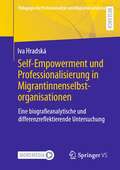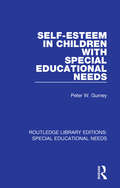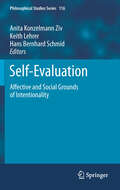- Table View
- List View
Self and Social Identity in Educational Contexts
by Kenneth I. Mavor, Michael J. Platow and Boris BizumicThis innovative volume integrates social identity theory with research on teaching and education to shed new and fruitful light on a variety of different pedagogical concerns and practices. It brings together researchers at the cutting edge of new developments with a wealth of teaching and research experience. The work in this volume will have a significant impact in two main ways. First and foremost, the social identity approach that is applied will provide the theoretical and empirical platform for the development of new and creative forms of practice in educational settings. Just as the application of this theory has made significant contributions in organisational and health settings, a similar benefit will accrue for conceptual and practical developments related to learners and educators – from small learning groups to larger institutional settings – and in the development of professional identities that reach beyond the classroom. The chapters demonstrate the potential of applying social identity theory to education and will stimulate increased research activity and interest in this domain. By focusing on self, social identity and education, this volume investigates with unprecedented clarity the social and psychological processes by which learners’ personal and social self-concepts shape and enhance learning and teaching. Self and Social Identity in Educational Contexts will appeal to advanced students and researchers in education, psychology and social identity theory. It will also be of immense value to educational leaders and practitioners, particularly at tertiary level.
Self and Subjectivity in Social Research
by Donna Maria Thomas Sarah DurstonThis is a book that thinks about what it means to be human and what this could mean for social research. Addressing ontological shifts across the social sciences, the book reconsiders the nature of self, experience and social reality and their implications for doing research differently. It delves into wide-ranging topics from the self in crisis, through the self and the nature of language, to ethics and the self. The book also: Helps you understand epistemology and ontology in practice with case studies of real world research; Critiques dominant approaches and examines global perspectives and contexts that challenge them; Explores the potential of interdisciplinary approaches to resolve tensions in social research; Discusses how ontology can shape research practice, policy development and social support systems. This book will help postgraduate students, academics, researchers and teachers embrace new ways of thinking about self and subjectivity. Donna M. Thomas is a Research Fellow at the University of Central Lancashire and Co-director of ICreateS International Research Unit & Research. Sarah Durston is head of the Sentience and Science Foundation, the Netherlands, honorary professor at UCLan and co-director of the ICreateS research unit, and professor in developmental neuroscience at Utrecht University, the Netherlands.
Self and Subjectivity in Social Research
by Donna Maria Thomas Sarah DurstonThis is a book that thinks about what it means to be human and what this could mean for social research. Addressing ontological shifts across the social sciences, the book reconsiders the nature of self, experience and social reality and their implications for doing research differently. It delves into wide-ranging topics from the self in crisis, through the self and the nature of language, to ethics and the self. The book also: Helps you understand epistemology and ontology in practice with case studies of real world research; Critiques dominant approaches and examines global perspectives and contexts that challenge them; Explores the potential of interdisciplinary approaches to resolve tensions in social research; Discusses how ontology can shape research practice, policy development and social support systems. This book will help postgraduate students, academics, researchers and teachers embrace new ways of thinking about self and subjectivity. Donna M. Thomas is a Research Fellow at the University of Central Lancashire and Co-director of ICreateS International Research Unit & Research. Sarah Durston is head of the Sentience and Science Foundation, the Netherlands, honorary professor at UCLan and co-director of the ICreateS research unit, and professor in developmental neuroscience at Utrecht University, the Netherlands.
Self in the World: Connecting Life's Extremes
by Keith HartEminent anthropologist Keith Hart draws on the humanities, popular culture and his own experiences to help readers explore their own place in history. We each embark on two life journeys – one out into the world, the other inward to the self. With these journeys in mind, anthropologist, amateur economist and globetrotter Keith Hart reflects on a life of learning, sharing and remembering to offer readers the means of connecting life’s extremes – individual and society, local and global, personal and impersonal dimensions of existence and explores what it is that makes us fully human. “This is a work of great originality. Keith Hart has had an unorthodox academic career and it has liberated him in many ways from academic pieties. His background in African ethnography gives him a fascinating angle on all sorts of things, not least the possibility of a more African-influenced global future. The book is full of surprises and mind-shifting observations. I actually couldn't put it down.”—Sherry B. Ortner, UCLA From the introduction: People have many sides, but I will focus here on two. Each of us is a biological organism with a historical personality that together make us a unique individual. But we cannot live outside society which shapes us in unfathomable ways. Human beings must learn to be self-reliant (not self-interested) in small and large ways: no-one will brush your teeth for you or save you from being run over while crossing the street. We each must also learn to belong to others, merging personal identity in a plethora of social relations and categories. Modern ideology insists that being individual and mutual is problematic. The culture of capitalist societies anticipates a conflict between them. Yet they are inseparable aspects of human nature.
Self of the Therapist in Medical Settings: A Sociocultural and Systemic Perspective (AFTA SpringerBriefs in Family Therapy)
by Max Zubatsky Jackie Williams-ReadeThis brief explores how the “person” of the therapist is developed when training and working in medical settings. It highlights important and often unspoken topics such as the personal, professional, cultural, ethical, and competency dilemmas new clinicians regularly face. The brief also addresses how personal experience with illness, death, cultural differences, and stigma may impact professionals in everyday practice. Topics featured in this Brief include:Helpful tips and tricks for new professionals entering a medical setting for the first time.Working with patients who suffer from chronic and terminal illnesses.Sociocultural norms and values that are often present in a medical setting.A new framework for identifying and treating professional burnout.How to handle ethical situations in medical organizations. Self of the Therapist in Medical Settings is a must-have resource for clinicians, professionals, supervisors, and faculty working in medical settings.
Self, Culture, and Others in Womanist Practical Theology (Black Religion/womanist Thought/social Justice Ser.)
by Phillis Isabella SheppardTo illustrate the complexities of black women's experiences of self-identification and racial embodiment, the author provides an account that engages both psychoanalytic theory and the role of religion and cultural objects in self-understanding.
Self, Reality and Reason in Tibetan Philosophy: Tsongkhapa's Quest for the Middle Way (Routledge Critical Studies in Buddhism #No. 18)
by Thupten JinpaThe work explores the historical and intellectual context of Tsongkhapa's philosophy and addresses the critical issues related to questions of development and originality in Tsongkhapa's thought. It also deals extensively with one of Tsongkhapa's primary concerns, namely his attempts to demonstrate that the Middle Way philosophy's deconstructive analysis does not negate the reality of the everyday world. The study's central focus, however, is the question of the existence and the nature of self. This is explored both in terms of Tsongkhapa's deconstruction of the self and his reconstruction of person. Finally, the work explores the concept of reality that emerges in Tsongkhapa's philosophy, and deals with his understanding of the relationship between critical reasoning, no-self, and religious experience.
Self-Alteration: How People Change Themselves across Cultures
by Michael Jackson Kathryn Rountree Nigel Rapport Banu Senay Max Harwood Gil Hizi Muhammad Kavesh Gisella Orsini Jaap TimmerMany of us feel a pressing desire to be different—to be other than who we are. Self-conscious, we anxiously perceive our shortcomings or insufficiencies, wondering why we are how we are and whether we might be different. Often, we wish to alter ourselves, to change our relationships, and to transform the person we are in those relationships. Not only a philosophical question about how other people change, self-alteration is also a practical care—can I change, and how? Self-Alteration: How People Change Themselves across Cultures explores and analyzes these apparently universal hopes and their related existential dilemmas. The essays here come at the subject of the self and its becoming through case studies of modes of transformation of the self. They do this with social processes and projects that reveal how the self acquires a non-trivial new meaning in and through its very process of alteration. By focusing on ways we are allowed to change ourselves, including through religious and spiritual traditions and innovations, embodied participation in therapeutic programs like psychoanalysis and gendered care services, and political activism or relationships with animals, the authors in this volume create a model for cross-cultural or global analysis of social-self change that leads to fresh ways of addressing the 'self' itself.
Self-Care for Black Men: 100 Ways to Heal and Liberate
by Jor-El CaraballoA self-care guidebook full of activities for Black men everywhere pursuing joy, creating connections, confronting racism, and working through intergenerational trauma.Black men desperately need care and restoration. But what does that restoration look like when you&’re a Black man in today&’s world? How do you take care of your mental health when men who look like you die at the hands of police? How do you find peace and refuge when you&’re not sure how to keep up with your partner? Or navigate a challenging workplace? While scrolling through social media feeds, you may feel like you don&’t have access to wellness like women do. But Black men need a space for self-care too. In Self-Care for Black Men, you will find practical answers to your questions. This book contains self-care strategies that address some of the most common issues Black men face, such as dealing with racism, navigating prejudice in the workplace, managing romantic relationships, and working through intergenerational trauma. This is your guide to wellness and self-discovery written specifically for Black men. There will opportunities to learn new skills to manage your mental health, as well as do more deep reflection on your own terms. It&’s time to take your health firmly within your own hands and Self-Care for Black Men will help you do that.
Self-Care for Black Women: 150 Ways to Radically Accept & Prioritize Your Mind, Body, & Soul (Self Care for Black Women)
by Oludara AdeeyoPrioritize your wellbeing with these 150 self-care exercises designed specifically to help Black women revitalize their outlook on life, improve their mental health, eliminate stress, and self-advocate.Between micro- and macro-aggressions at school, at work, and everywhere in between, it&’s tough to prioritize physical and mental wellness as a Black woman, especially with a constant news cycle highlighting Black trauma. Now, with The Self-Care for Black Women you&’ll find more than 150 exercises that will help you radically choose to put yourself first. Whether you need a quick pick-me-up in the middle of the day, you&’re working through feelings of burnout, or you need to process a microaggression, this book has everything you need to feel more at peace. You&’ll find prompts like: -Map out your feelings about a microaggression -Make a list of your safe spaces -Detail out an entire day dedicated to your self-care -And more! It&’s time to put yourself first and prioritize your self-care once and for all—and this book is here to help you do just that.
Self-Compassion for Parents: Nurture Your Child by Caring for Yourself
by Susan M. Pollak"I yelled at the kids again--and feel so ashamed." "I barely have time to shower, let alone exercise; no wonder I’m so out of shape." "I'm just not the dad I hoped I would be." Parenting is hard. That's why self-compassion is so important. In this empathic resource, mindfulness expert and psychologist Susan M. Pollak helps you let go of constant self-judgment and treat yourself with the same kindness and caring you strive to offer your kids. Simple yet powerful guided meditation techniques (most under three minutes long) are easy to practice while doing the dishes, driving to work, or soothing a fussy baby. Learn to respond to your own imperfections like a supportive friend, not a harsh critic. You will find yourself happier and more energized--and will discover new reserves of patience and appreciation for your kids.
Self-Construction in a Transcultural Context: Young Chinese Immigrants Constructing Selves in the UK
by Yijia ZuoThis book explores the ways in which individuals construct and integrate self-positions in a transcultural context, by adopting a pluralist theoretical and methodological approach that includes both Western post-modern viewpoints and ancient Chinese philosophical ideas.The book starts with stories of two second-generation Chinese young people and their mothers' life experiences in the UK, which can be seen as an epitome of individuals living in the modern and complex environment of the time. Using social constructionist viewpoints, it then analyzes the overt interaction between the individual and outside environment and interprets the recessive interaction, such as the individual’s psychological response to the outside environment, which might be unknown to him or herself, using the psychodynamic approach based on object relations theory and other psychoanalytic concepts, such as defense mechanisms. The book uses Confucian philosophy to show how Chinese people think about the relation between other people and themselves and also integrates different and even opposing theories and viewpoints from Taoist philosophy.This creative book provides a theoretical and practical approach to explore the conception of “self” and the way in which individuals construct their self-positions in a complex context. Combining cutting-edge Western psycho-social viewpoints and ancient Chinese philosophy, it appeals to readers interested in “self,” psycho-social approaches, psychoanalytic viewpoints and Chinese philosophy.
Self-Contained: Scenes from a single life
by Emma JohnThere is a piece of cod-wisdom regularly dispensed to single women: romance will arrive when you least expect it. I had assumed it would also make its own travel arrangements too. Emma John is in her 40s; she is neither married, nor partnered, with child or planning to be.In her hilarious and unflinching memoir, Self Contained, she asks why the world only views a woman as complete when she is no longer a single figure and addresses what it means to be alone when everyone else isn't.In her book, she captures what it is to be single in your forties, from sharing a twin room with someone you've never met on a group holiday (because the couples have all the doubles with ensuite) to coming to the realisation that maybe your singleness isn't a temporary arrangement, that maybe you aren't pre-married at all, and in fact you are self-contained.The book is an exploration of being lifelong single and what happens if you don't meet the right person, don't settle down with the wrong person and realise the biggest commitment is to yourself.
Self-Control and Crime Over the Life Course: Lilly: Criminological Theory 6e + Hay: Self-control And Crime Over The Life Course
by Carter H. Hay Ryan C. MeldrumWhat exactly is self-control, and what life outcomes does it affect? What causes a person to have high or low self-control to begin with? What effect does self-control have on crime and other harmful behavior? Using a clear, conversational writing style, Self-Control and Crime Over the Life Course answers critical questions about self-control and its importance for understanding criminal behavior. Authors Carter Hay and Ryan Meldrum use intuitive examples to draw attention to the close connection between self-control and the behavioral choices people make, especially in reference to criminal, deviant, and harmful behaviors that often carry short-term benefits but long-term costs. The text builds an overall theoretical perspective that conveys the multi-disciplinary nature of modern-day self-control research. Moreover, far from emphasizing only theoretical issues, the authors place public policy at the forefront, using self-control research to inform policy efforts that reduce the societal costs of low self-control and the behaviors it enables.
Self-Control and Crime Over the Life Course: Lilly: Criminological Theory 6e + Hay: Self-control And Crime Over The Life Course
by Carter H. Hay Ryan C. MeldrumWhat exactly is self-control, and what life outcomes does it affect? What causes a person to have high or low self-control to begin with? What effect does self-control have on crime and other harmful behavior? Using a clear, conversational writing style, Self-Control and Crime Over the Life Course answers critical questions about self-control and its importance for understanding criminal behavior. Authors Carter Hay and Ryan Meldrum use intuitive examples to draw attention to the close connection between self-control and the behavioral choices people make, especially in reference to criminal, deviant, and harmful behaviors that often carry short-term benefits but long-term costs. The text builds an overall theoretical perspective that conveys the multi-disciplinary nature of modern-day self-control research. Moreover, far from emphasizing only theoretical issues, the authors place public policy at the forefront, using self-control research to inform policy efforts that reduce the societal costs of low self-control and the behaviors it enables.
Self-Declaration in the Legal Recognition of Gender (Social Justice)
by Chris DietzSelf-Declaration in the Legal Recognition of Gender examines the impact of legislation premised upon the principle of ‘self-declaration’ of legal gender status. Existing doctrinal and comparative analyses have tended to come out strongly in favour of, or against, self-declaration. This book offers a socio-legal alternative which focuses on how self-declaration is experienced, on an embodied level, by trans and gender diverse people. It presents research conducted in Denmark, which became the first European state to adopt self-declaration in June 2014. By analysing Danish law through a Foucauldian framework which brings together socio-, feminist, and trans legal scholarship on embodiment and jurisdiction, the book offers the first empirically based and theoretically informed analysis of self-declaration. It draws upon legal consciousness, affect theory, vulnerability, and governmentality literatures to argue that the jurisdictional boundaries which existed between law and medicine were maintained throughout the reform process. This limited the impact of the legislation, enabling access to health care to be restricted in the same year in which amending legal gender status was liberalised. As the list of states that have adopted self-declaration increases, this intervention offers activists and policymakers insights which might shape how they respond to similar reform proposals in the future. A timely and important assessment, this book will appeal to researchers and practitioners working in trans, gender, feminist legal, and socio-legal studies.
Self-Defense for Women: Fight Back
by Loren W. Christensen Lisa Christensen"Somewhere in America right now are four or five women who will be killed tomorrow. They are going about their day, and I know if they were prepared to counter attack in the ways Loren and Lisa Christensen teach, they'd have a far better chance of prevailing tomorrow." --Gavin de Becker, best-selling author of The Gift of Fear.Some "experts" say you should be submissive when attacked at home or by a stranger. You won't find that advice here, although you might use it as a ruse before you claw your assailant's eyes and smash his groin. Your ultimate goal is to get away, but you don't achieve that by being meek and docile. You get away by drawing on that hardwired survival instinct to attack him like an enraged lioness protecting her babies.In Self-Defense for Women: Fight Back, martial arts experts Loren W. Christensen and Lisa Christensen teach you to use your hands, forearms, elbows, teeth, knees, and feet to survive the attacks unsuspecting women become the victims of every day. And you will learn that you're surrounded by a limitless cache of weapons you can use to your advantage against a larger assailant.* How to recognize and assess a threat* How to de-escalate a bad situation* 7 basic defensive techniques any woman can use effectively* Advanced skills for when you want to know more* How to identify and use everyday objects as defensive weapons* What to practice to prepare for a potential confrontation* How to practice at home, alone, and with a partner* Why you need to be physically fit and how to make a fitness plan* How to use fear as a weapon* The power of your mind and how to harness it for self-defenseIf you're ready to learn to fight back, Loren and Lisa know exactly what you need to survive an attack in your home or on the street.
Self-Defense in Mexico: Indigenous Community Policing and the New Dirty Wars (Latin America in Translation/en Traducción/em Tradução)
by Luis Hernández NavarroIn Mexico and across other parts of Latin America local Indigenous peoples have built community policing groups as a means of protection where the state has limited control over, and even complicity in, crime and violence. Luis Hernandez Navarro, a leading Mexican journalist, offers a riveting investigation of these armed self-defense groups that sprang up around the time of the 1994 Zapatista uprising in Chiapas. Available in English for the first time, the book spotlights the intense precarity of everyday life in parts of Mexico. Hernandez Navarro shows how the self-defense response, which now includes wealthier rancher and farmer groups, is being transformed by Mexico's expanding role in the multibillion dollar global drug trade, by foreign corporations' extraction of raw minerals in traditionally Indigenous lands, and by the resulting social changes in local communities. But as Hernandez Navarro acknowledges, self-defense is highly controversial. Community policing may provide citizens with increased agency, but for government officials it can be a dangerous threat to the status quo. Leftists and liberals are wary of how the groups may be linked to paramilitary forces and vulnerable to manipulation by drug traffickers and the government alike. This book answers the urgent call to understand the dangerous complexities of government failures and popular solutions.
Self-Determination and Causal Agency Theory: Integrating Research into Practice (Positive Psychology and Disability Series)
by Karrie A. Shogren Sheida K. RaleyThis book introduces Casual Agency Theory as a framework for defining self-determination and describing its development and essential characteristics. It synthesizes the research on promoting and enhancing self-determination and explores implications for practice in a disability context across the life course. The book also highlights future directions for theory, research, and practice in areas of positive psychology and disability. Key areas of coverage include: Theoretical basis of the development of self-determination as well as research findings and implications for practice across the life course. Issues relating to the implementation of evidence-based practices to promote self-determination in a disability context. Potential strategies for overcoming barriers to self-determination through research-based practices. Future directions for further integrating Casual Agency Theory into positive psychology interventions and the systems of supports in the disability field. Self-Determination and Causal Agency Theory is an essential resource for researchers, professors, and graduate students as well as clinicians, therapists, and other professionals in the fields of developmental and positive psychology, educational policy and practice, special education, social work, occupational, speech, and language therapy, public health, and healthcare policy.
Self-Determined First Nations Museums and Colonial Contestation: The Keeping Place (Museums in Focus)
by Robert Hudson Shannon WoodcockSelf-Determined First Nations Museums and Colonial Contestation explores Indigenous practices of curation, object repatriation, and cross-cultural community engagement in a dynamic Koori museum. Grounded in the fact that Gunai Kurnai people have never ceded sovereignty, the text reorients dominant temporal and colonial approaches of museum studies to document and theorise Gunai Kurnai self-presentation and community engagement in the Krowathunkooloong Keeping Place. Researched and co-authored by the Cultural Manager of the Keeping Place, Gunai Kurnai Monero Ngarigo man Robert Hudson, and white Historian Shannon Woodcock, the book traces the temporal, social, and cultural considerations of the Elders who curated the permanent exhibition in the early 1990s. Discussing community management of a collection growing through the ongoing repatriation of tools, art, and Ancestor remains, the text also explores how Robert Hudson engages with visitors to the Keeping Place and local colonial history museums, and theorises the power of Gunai Kurnai work with individuals and institutions in the small museum context. Finally, Hudson and Woodcock demonstrate that the Keeping Place articulates sophisticated Gunai Kurnai-grounded methodologies of museum practice in relation to international critical Indigenous studies scholarship. Self-Determined First Nations Museums and Colonial Contestation provides a vital case study of an Indigenous museum space written from an inside perspective. As such, the book will be essential reading for scholars and students engaged in the study of museums and heritage, Indigenous peoples, decolonisation, race, anthropology, culture, and history.
Self-Development Skills
by Dandi Daley MackallThe Career Skills Library describes the skills, traits, and attributes that are crucial to success in any field. This series details the competencies identified by the Department of Labor's SCANS (Secretary's Commission on Achieving Necessary Skills) as essential to solid job performance. Each book focuses on one of these skills in the workplace and shows how students can improve that skill while still in school. Self-Development -- Examine traits like dependability, integrity, and honesty that will help you succeed in all areas of your life.
Self-Devouring Growth: A Planetary Parable as Told from Southern Africa (Critical Global Health: Evidence, Efficacy, Ethnography)
by Julie LivingstonUnder capitalism, economic growth is seen as the key to collective well-being. In Self-Devouring Growth Julie Livingston upends this notion, showing that while consumption-driven growth may seem to benefit a particular locale, it produces a number of unacknowledged, negative consequences that ripple throughout the wider world. Structuring the book as a parable in which the example of Botswana has lessons for the rest of the globe, Livingston shows how fundamental needs for water, food, and transportation become harnessed to what she calls self-devouring growth: an unchecked and unsustainable global pursuit of economic growth that threatens catastrophic environmental destruction. As Livingston notes, improved technology alone cannot stave off such destruction; what is required is a greater accounting of the web of relationships between humans, nonhuman beings, plants, and minerals that growth entails. Livingston contends that by failing to understand these relationships and the consequences of self-devouring growth, we may be unknowingly consuming our future.
Self-Empowerment und Professionalisierung in Migrantinnenselbstorganisationen: Eine biografieanalytische und differenzreflektierende Untersuchung (Pädagogische Professionalität und Migrationsdiskurse)
by Iva HradskáDas Forschungsinteresse dieser Studie richtet sich auf das Zusammenspiel von Biografie und Professionalisierungsprozessen von Akteurinnen in Migrantinnenselbstorganisationen (MSO) bei der Ausübung ihrer Bildungs- und Beratungsarbeit. Es werden drei Fallanalysen mit markanten Innenansichten präsentiert. Als Ergebnis werden drei Muster vorgestellt, die auf unterschiedliche Herstellungsprozesse biografischer Passungsverhältnisse individueller undorganisationaler Professionalisierung und Self-Empowermentstrategien der Akteurinnen verweisen. Die Muster zeigen, dass die Akteurinnen eine bestehende dynamische Wechselbeziehung zwischen der ausgeübten Tätigkeit und den Interaktionsressourcen aus ihren Migrationsbiografien zu nutzen und individuelle Lösungs- und Bewältigungsstrategien bei der Professionalisierung und Etablierung der MSO anzuwenden vermögen. Die priorisierten Zielverständnisse ihrer Tätigkeit unterscheiden sich entlang der drei ausgearbeiteten Muster: die Möglichkeiten die gesellschaftliche Partizipation von Migrantinnen zu erhöhen, Selbstverwirklichung der Migrantinnen zu unterstützen und migrations- und geschlechtsbezogene Exklusionsprozesse zu minimieren.
Self-Esteem in Children with Special Educational Needs (Routledge Library Editions: Special Educational Needs #28)
by Peter W. GurneyFirst published in 1988. The mounting concern in schools over widespread failure in academic achievement, greater disaffection in children and the lack of confidence in many school leavers are highlighted by the difficulties experienced by children who have special educational needs. Within this group the importance of the child’s evaluation of him or herself – i.e. self-esteem – is a neglected issue. This book investigates how the level of self-esteem appears to influence social behaviour and school performance in children with special educational needs. It discusses the practical steps that can be taken to assess and enhance self-esteem in children with special needs and evaluates their effectiveness. The author emphasises the discrepancy between the performance of children who have special educational needs in ordinary classrooms with that achieved in special settings. He argues that the negative impact on a child’s self-esteem created by placing him/her in an ordinary classroom may outweigh the benefits of greater integration. A full and informative treatment of both the theoretical and practical implications of a neglected subject, this text book is suitable for experienced special educational needs teachers and those undergoing teacher training, as well as psychologists with an academic interest in the self-concept or a professional involvement in assessing children.
Self-Evaluation
by Hans Bernhard Schmid Keith Lehrer Anita Konzelmann ZivThe book contains contributions by leading figures in philosophy of mind and action, emotion theory, and phenomenology. As the focus of the volume is truly innovative we expect the book to sell well to both philosophers and scholars from neighboring fields such as social and cognitive science. The predominant view in analytic philosophy is that an ability for self-evaluation is constitutive for agency and intentionality. Until now, the debate is limited in two (possibly mutually related) ways: Firstly, self-evaluation is usually discussed in individual terms, and, as such, not sufficiently related to its social dimensions; secondly, self-evaluation is viewed as a matter of belief and desire, neglecting its affective and emotional aspects. The aim of the book is to fill these research lacunas and to investigate the question of how these two shortcomings of the received views are related.
